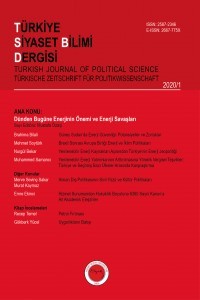Brezilya Federal Devleti ve Kamu Politikası Üzerine Bir İnceleme
1985 yılında son bulan askerî rejim ardından gelen demokrasi ile birlikte Brezilya’da devlet yönetimi ve kamu politikası süreci değişime uğramıştır. Brezilya’da tam anlamıyla bir demokratik yönetime resmî geçiş, 1988 Brezilya Anayasası ile gerçekleşmiş ve adem-i merkeziyetçiliğin kamu yönetiminde yoğunlaşmasının yanı sıra kamu politikalarının oluşturulmasında ve yönetilmesinde devlet dışı aktörlerin katılımının yolunu açan yapısal örgütler kurulmuştur. Bu kapsamda en önemli gelişme, “kamu politikası yönetim konseyleri” oluşumudur. Özel sektör sermayeli ve çok uluslu şirketler ve basın yayın kuruluşları da son yıllarda kamu politikası sürecine etkin bir şekilde dahil olan diğer politika aktörleridir. Bu gelişmeler doğrultusunda ise Brezilya’da kamu politikaları süreci daha şeffaf, hesapverebilir ve katılımcı bir sistem çerçevesinde yeniden düzenlenmiştir. Bu çalışma, Brezilya federal devlet yönetiminin temel niteliklerini ve kamu politikası yapım sürecinde yer alan aktörleri analiz etmeyi amaçlamaktadır.
Anahtar Kelimeler:
Brezilya, kamu politikası, yönetişim, dönüşüm
A Study on the Brazilian Federal Government and Public Policy
With the democracy that followed the military regime that ended in 1985, the state administration and public policy process in Brazil have changed. The official transition to a fully democratic government in Brazil took place with the 1988 Brazilian Constitution, and in addition to the intensification of decentralization in public administration, structural organizations were established that paved the way for the participation of non-state actors in the formulation and management of public policies. In this context, the most significant improvement is the formation of “public policy management councils”. Private sector and multinational companies and media organizations are other policy actors that have been actively involved in the public policy process in recent years.In line with these developments, the public policy process in Brazil has been rearranged within the framework of a more transparent, accountable, and participatory system. This study aims to analyze the main characteristics of the Brazilian federal government and the actors that involve the public policy-making process.
Keywords:
Brazil, Public Policy, Governance, Transformation,
___
- Ames, B. (1999). Approaches to the Study of Institutions in Latin American Politics. The Latin American Research Review, 34(1), 221- 236.
- Barth, J. (2006). Public Policy Management Councils in Brazil: How Far Does Institutionalised Participation Reach?. Public Administration and Development, 26, 253- 263.
- Beramendi, P., Rogers, M. ve Diaz- Cayeros, A. (2017). Barriers to Egalitarianism: Distributive Tensions in Latin American Federations. Latin American Research Review, 52(4), 529- 551.
- Birkland, A. T., (2015). An Introduction to the Policy Process- Theories, Concepts and Models of Public Policy Making. New York: Routledge Publications.
- Borges, A. (2011). The Political Consequences of Center-Led Redistribution in Brazilian Federalism: The Fall of Subnational Party Machines. Latin American Research Review, 46(3), 21- 45.
- Bresser- Pereira, L. C. ve Spink, P. (1999). Reforming the State: Public Administration in Latin America içinde “From Bureaucratic to Managerial Public Administration in Brazil”. Boulder, Colorado: Lynne Rienner Publishers, 115- 146.
- Candler, G. G. (2002). Particularism versus Universalism in the Brazilian Public Administration Literature, Public Administration Review, 62(3), 298- 306.
- De Melo Romão W., Gurza Lavalle A., Zaremberg G. (2017). Political Intermediation and Public Policy in Brazil: Councils and Conferences in the Policy Spheres of Health and Women’s Rights içinde: Zaremberg G., Guarneros-Meza V., Gurza Lavalle A. (eds) Intermediation and Representation in Latin America. Studies of the Americas. Palgrave Macmillan,
- Dye, R. T. (1995). Understanding Public Policy, New York: Pearson Publication.
- Jha, C. P. (2007). Decentralization and Federalism in Brazil. The Indian Journal of Political Science, 68(1), 157- 171.
- Nagle, E. L. (2000). The Cinderella of Government: Judicial Reform in Latin America. California Western International Law Journal, 30(2), 345- 379.
- Nino, S. C. (1992). The Debate over Constitutional Reform in Latin America. Fordham International Law Journal, 16(3), 634- 651. Ostrom, V. (1991). The Meaning of American Federalism: Constituting a Self- Governing Society. Institute for Contemporary Studies: San Francisco.
- Rosenn, K. S. (2005). Federalism in Brazil. Duquesne Law Review, 43(4), 577- 598.
- Spada, P. ve diğerleri. (2016). Effects of the Internet on Participation: Study of a Public Policy Referandum in Brazil. Journal of Information Technology & Politics, 13(3), 187- 207.
- Stein, E. (1999). Fiscal Decentralization and Government Size in Latin America, Journal of Applied Economics, 2(2), 357- 391.
- Stokes, S. W. (1945). V. Parliamentary Government in Latin America, The American Political Science Review, 39(3), 522- 536.
- Uprimny, R. (2011). The Recent Transformation of Constitutional Law in Latin America: Trends and Challenges, Texas Law Review, 89(1587), 1587- 1609.
- Wampler, B. (2015). Councils and Conferences: Health Care, Housing, and Social Services içinde Activating Democracy in Brazil: Popular Participation, Social Justice, and Interlocking Institutions, 131–168. University of Notre Dame Press.
- Weder, J. R. ve diğerleri. (2005). Toward an Anthropology of Public Policy. The Annals of the American Academy, 600, 30- 51.
- Willis, E., Garman, C. B. ve Haggard, S. (1999). The Politics of Decentralization in Latin America. Latin American Research Review, 34(1), 7- 56.
- Zengin, 0. (2012). Hükümet Sistemleri Bakımından Türkiye- Latin Amerika Değerlendirmesi, Ankara Üniversitesi Yayınları No. 380: Ankara, 285- 310.
- ISSN: 2587-2346
- Başlangıç: 2018
- Yayıncı: Yozgat Bozok Üniversitesi
Sayıdaki Diğer Makaleler
Covid-19 Salgınının Eşitsizlik ve Yoksulluğa Etkisi: Latin Amerika Örneği
En Yüksek Cam Tavanlara Meydan Okumak: Latin Amerika Kadın Devlet Başkanları
Brezilya Federal Devleti ve Kamu Politikası Üzerine Bir İnceleme
Pretoryenizmin Sürekliliği Açısından Latin Amerika ve Türkiye’deki Askeri Darbeler: 1960-1980
Kolombiya – FARC Barış Sürecinin Uygulanması: Sorunlar ve Riskler
6360 Sayılı Kanun ile Köyden Mahalleye Dönen Yerlerdeki Sorunlar Üzerine Bir Değerlendirme
Bolsonaro Döneminde Brezilya’nın Amazonlar Politikası
Ceren UYSAL OĞUZ, Canan KIŞLALIOĞLU
